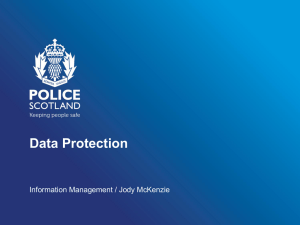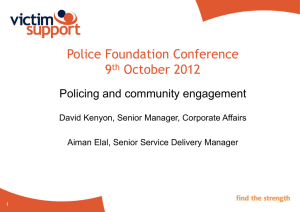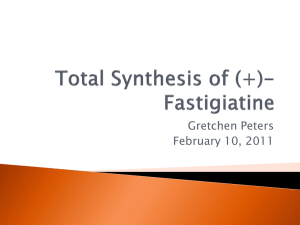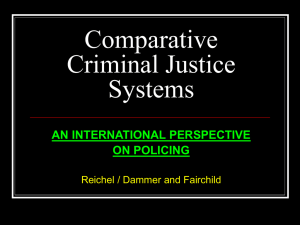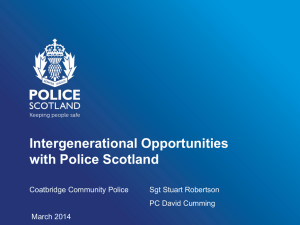the presentation
advertisement
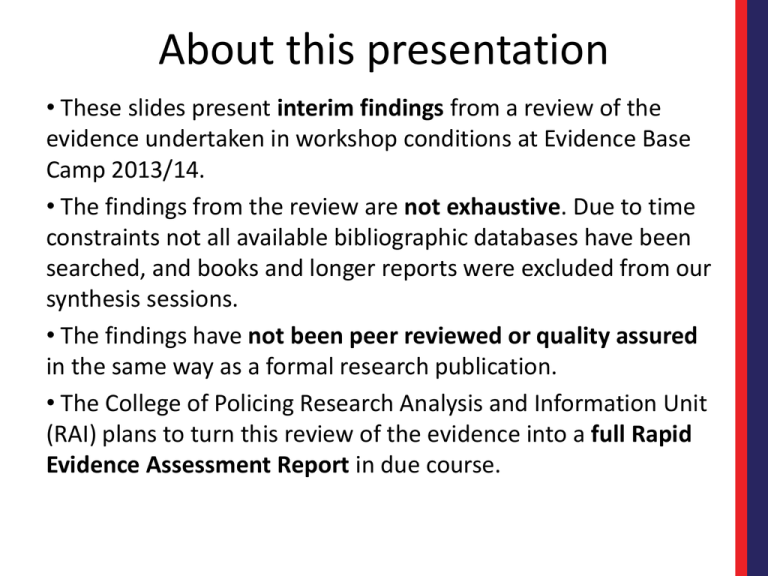
About this presentation • These slides present interim findings from a review of the evidence undertaken in workshop conditions at Evidence Base Camp 2013/14. • The findings from the review are not exhaustive. Due to time constraints not all available bibliographic databases have been searched, and books and longer reports were excluded from our synthesis sessions. • The findings have not been peer reviewed or quality assured in the same way as a formal research publication. • The College of Policing Research Analysis and Information Unit (RAI) plans to turn this review of the evidence into a full Rapid Evidence Assessment Report in due course. What interventions have been shown to be effective in supporting individuals during an acute mental health crisis Delegates: Jane Birkett NCA Steve Bussey Wiltshire Police Paul Clarke Dyfed-Powys Police Clare Gollop Devon & Cornwall Police Maria Kerr NCA Julie Miller College of Policing James O'Dwyer NCA Stephen Precious College of Policing Shaun Pyke Cheshire Police Claire Smith College of Policing Timothy Young Leicestershire Police College of Policing: Mark Abram - RAI Rory McKenna - RAI Graham Cline – National Police Library Anna Akerman - PIU How did we answer the question? • Using a Rapid Evidence Assessment (REA) • REAs follow a systematic process to identify and appraise evidence… • …but make compromises given available time and resources • Pragmatic and transparent approach • Ensure best possible coverage of literature in the time available The process (in a nutshell) 1. Draft search terms 2. Draft sift criteria 3. Sift received abstracts 4. Request relevant papers 5. Read and ‘grade’ papers 6. Write it up (‘synthesis’) Developing search terms What interventions have been shown to be effective in supporting individuals during an acute mental health crisis ? Tier Area Synonyms include… 1 Is the study about acute mental health episodes, Mental health; suicide; bipolar; schizophrenic; manic; psychotic; paranoid or acute panic. 2 Events or crises Attack; event; episode; crisis; emergency. 3 Intervention Tactic; intervention; strategy; initiative; procedure; approach; response. 4 What Works Systematic review; rapid evidence assessment; trial; RCT; experiment; evaluation; effective; assessment; “What works”; impact; success. Search outcomes Mental Health Events or Intervention Our search identifies studies that mention all four of our areas: Mental Health, Events or crises, Interventions and ‘What Works’… crises What Works 1408 potentially relevant studies identified. Searches find all potentially relevant studies… Returned by the mental health search… Stephen Kisely et al. A Controlled Before-and-After Evaluation of a Mobile Crisis Partnership Between Mental Health and Police Services in Nova Scotia, 55 CANADIAN JOURNAL OF PSYCHIATRY-REVUE CANADIENNE DE PSYCHIATRIE.662, 662668 (2010). Abstract: This study examined the impact of an integrated mobile crisis team formed in partnership between mental health services, municipal police, and emergency health services. We used a controlled before-and-after quantitative comparison of the intervention area with a control area without access to such a service, for 1 year before and 2 years after program implementation. The integrated service resulted in increased use by people in crisis, families, and service partners (for example, from 464 to 1666 service recipients per year). Sifting our abstracts identifies the truly relevant literature. Sift criteria is used so that we are consistent and transparent in our sifting. Sifting – inclusion criteria Q1. Q2. Q3. Question Answer Action Is the study about acute mental health episodes, events or crises No Exclude Yes Go to Q2 Unclear Exclude Does the paper address interventions or approaches to manage, support or respond to individuals during an acute mental health crisis No Exclude Yes Go to Q3 Unclear Exclude Does the paper include: No Exclude Empirical data/ methods Yes Include Unclear Can’t exclude Sifting – flow of papers Searches of online databases and library catalogue N=1408 Abstrac t and title screene d N=140 8 Full text screene d N=55 Reports meeting inclusion criteria & mapped N=18 Papers excluded: Total N=55/38 Papers sifted out: N=1353 Reasons for exclusion: • Did not meet sift criteria. Reasons for exclusion: • Publication not available • Duplicates n=16 n=1 Our initial search identified 1408 papers, but only 38 available papers (3%) were actually relevant to our research question. Our findings are drawn from these 38 studies that we have reviewed over the last two days. • We searched the main databases available to the National Police Library • Around 30% (n=16) of the screened studies were not available Synthesis – Mapping the evidence Publication Date 10 9 8 7 6 5 4 3 2 1 0 1970-1979 1980-1989 1990-1999 2000-2009 2010+ Synthesis – Mapping the evidence Country of focus 10 9 8 7 6 5 4 3 2 1 0 UK USA Australia Canada Norway Synthesis – Mapping the evidence Intervention Type 10 9 8 7 6 5 4 3 2 1 0 Community Care Crisis Intervention Team (CIT) training Crisis Partnerships Caregivers Community Safety Officer What does ‘good’ or ‘robust’ evidence look like? Statements about ‘what works’ Systematic Reviews (Based on level 3-5 studies) 5 Statements about ‘what’s promising’ Statements about possible impact Randomised controlled trials 4 Before/after measures Multiple site comparisons 3 Before/after measures Two site comparisons 2 Before/after measures No comparison site 1 One-off measure No comparison site Study designs increasingly rule out potential alternative causes Study designs cannot rule out potential alternative causes - im 5 4 3 2 1 re Re vi ew Q ua lit at iv e Le ve l Le ve l Le ve l Le ve l Le ve l di es pa ct st u Li te ra tu No n Synthesis – Quality of evidence Number of studies 8 7 6 5 4 3 2 1 0 Synthesis What Works There is evidence from one RCT to show that a community-based 24 hour Crisis Resolution Team (CRT) is able to significantly reduce hospital admissions within eight weeks of an acute MH crisis. What’s Promising There is promising evidence to suggest that a mobile crisis service team involving clinicians and police officers was associated with reduced time-on-scene despite increased service use across a 2-year period. There is also promising evidence that Crisis Intervention Team (CIT) training improves linkages to mental health services and reduces officers’ use of force with people experiencing mental health crises. What’s Unknown The majority of studies did not assess treatment outcomes for people experiencing mental health crises (i.e. referral rates were focused on as opposed to mental well-being at follow up). The impact of CIT training on arrest rates is unclear however one level three study found no effect. What Doesn’t Work What’s Harmful There was no evidence to identify harmful approaches to intervene with individuals experience mental health crises. Non-impact studies suggest None identified Key messages What interventions have been shown to be effective in supporting individuals during an acute mental health crisis? • Most studies were published in the last 3 years and the majority were undertaken in the US. • The overall quality of evidence in low. • There are 5 types of interventions including measures to provide alternate referral routes, officer training, and partnerships with healthcare specialists • The most promising approach appears to be crisis intervention team training and mobile crisis partnerships but the supporting evidence is limited. • More research is needed and could focus on experimental trials of CIT training in the context of call handling, first responding and custody. Research could also focus on crisis partnership working within the UK. Outcomes relating to appropriate use of force, appropriate referral rates and outcomes for individuals who have experienced an acute mental health crisis could be assessed, e.g. satisfaction, mental well-being. Key measures • Research design should be informed by a feasibility study which takes account of the following; current practice and local interventions amongst forces, availability and quality of data, profile requirements by force, emerging findings from the MPS implementation of the Vulnerability Assessment Framework (VAF). • Clarity of appropriate outcomes and measures




